Vitamin E for Horses: How much does my Horse need?
Vitamin E for horses: What is its function?
Vitamin E is a term used to describe a group of compounds known as tocopherols and tocotrienols. These are fat-soluble substances. The most prominent biological function of Vitamin E is that of an antioxidant. Together with other substances (albumin, bilirubin, glutathione, uric acid) it protects individual cells every day (NRC, 2012). Vitamin E is the most important lipid-soluble antioxidant responsible for the integrity of biological structures such as cell membranes. In situations of oxidative stress, Vitamin E for horses binds to the free radicals, reducing the likelihood of an uncontrolled chain of oxidative damage (Fagan et al, 2017).
Vitamin E for horses: What are the benefits?
As a horse exercises, the muscles demand for energy increases and in turn the number of free radicals produced increases. To avoid damage to muscle cells during exercise, adequate levels of antioxidants must be available to counter all the extra free radicals that are being generated. As long as there are sufficient antioxidants in the muscle tissues, oxidative stress can be avoided (Fagan et al, 2017).
Vitamin E for horses: What are my horse’s requirements?
The Vitamin E requirement for horses, according to the Nutrient Requirements of Horses (NRC, 2012) is 800-900 IU for a 500kg horse in light work, per day This is often achieved by providing the horse with roughages such as hay and pasture. However, the Vitamin E content of hay begins to decline up to 50% as soon as it is harvested and stored (McDowell, 1989). As a horse’s work increases, the energy, vitamin and mineral requirements increase and supplementation of Vitamin E is required.
Vitamin E for horses: How do I increase my horse’s intake?
Premixed feeds will often include an adequate amount of Vitamin E, however in most cases horse owners are not feeding the 3-5kg recommended daily intake, which can lead to deficiencies. One easy way to rectify this is to use a supplement that contains Vitamin E, which will help correct any nutrient pitfalls in your horse’s diet. Vitamin E is one of the most important nutrients for a performance horse, which is why it is included in a number of Ranvet products. To help you select which supplement might be right for your horse, please refer to the table below:
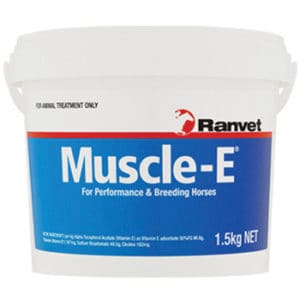
Key Benefits:
- Supplies a concentrated, bio-available source of Vitamin E and other key nutrients to support optimal recovery.
- Help to improve recovery times for high performance horses.
What type of horse is this suitable for?
- Horse prone to tying-up.
- Horses that struggle to recover after competitions.
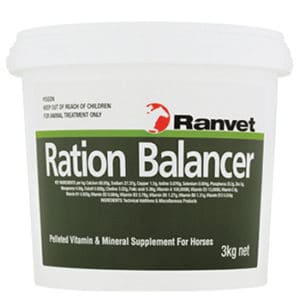
Key Benefits:
- A-Z Multivitamin.
- An everyday supplement for owners wanting to ensure their horse’s vitamin & mineral requirements are being met.
- Contains Vitamin E.
What type of horse is this suitable for?
- Suitable for all horses.
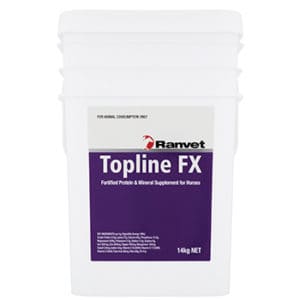
Key Benefits:
- Ideal for performance horses that require more muscle and topline.
- Contains Vitamin E.
What type of horse is this suitable for?
- Suitable for all horses.
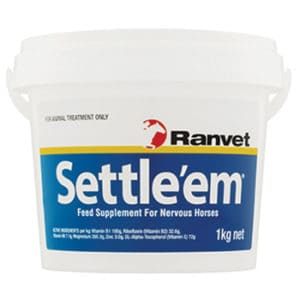
Key Benefits:
- Supplies a concentrated source of Vitamin E, along with B1 and magnesium to reduce hyperactive behavior.
What type of horse is this suitable for?
- Suitable for hyperactive horses.
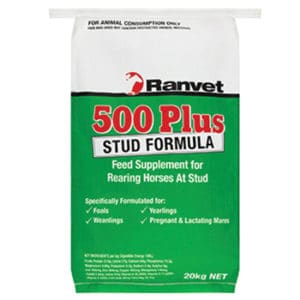
Key Benefits:
- Supplies a concentrated source of vitamins and minerals to support bone growth and development in performance horses.
What type of horse is this suitable for?
- Suitable for growing & breeding horses.
If you are unsure if your horses Vitamin E requirements are being met, Ranvet’s Nutritionists can evaluate your horse’s diet to ensure your horse is provided with sufficient Vitamin E. Please complete our FREE online diet evaluation to check your horse’s diet today:
https://www.ranvet.com.au/nutrition-centre/diet-evaluation/
Sources:
Fagan, M., Pazdro, R, Call., Abrams, A., Harris, P., Krotky, A., Duberstein, K (2017). Assessment of oxidative stress and muscle damage in exercising horses in response to level and form of vitamin E. Journal of Equine Veterinary Science. 52, 80-81.
McDowell, L (1989). Vitamins in Animal Nutrition. San Diego, CA: Academic Press, 93-131
Nutritional Research Council, Nutritional Requirement of Horses, Sixth Revised Edition, 2012
Experts in Equine Nutrition
Every product in the Ranvet range has been developed to meet a horse’s most specific need at any given time, be it in a training environment or on a breeding farm. Having pioneered the formulation of specific medications and dietary supplements for horses, the company is now recognised as a leader in the areas of equine health and nutrition.
